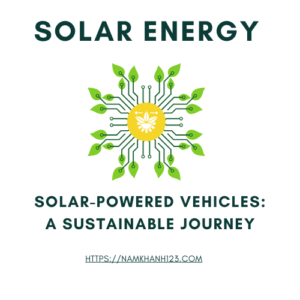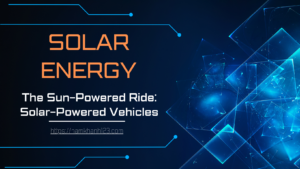The realm of transportation is on the cusp of a revolution, with solar-powered technology at its forefront. This article delves into the transformative impact of solar-powered transportation, exploring how it is reshaping the way we travel and contributing to a more sustainable world.
The Dawn of Solar-Powered Transportation
Solar-powered transportation represents a significant leap forward in the quest for sustainable travel. By harnessing the sun’s energy, these vehicles offer an eco-friendly alternative to traditional fossil fuel-powered transportation. From solar-powered cars and buses to trains and even boats, this technology is making strides in various modes of transport, signaling a paradigm shift in how we think about mobility.
Technological Innovations Fueling the Change
The progress in solar-powered transportation is underpinned by rapid advancements in technology. Improvements in solar panel efficiency, battery storage, and energy conversion are driving this sector forward. Innovators are continually finding new ways to integrate solar technology into vehicles, making them more efficient, reliable, and accessible to the public.
Environmental Impact and Sustainability
One of the most compelling aspects of solar-powered transportation is its environmental benefits. These vehicles emit no greenhouse gases during operation, significantly reducing air pollution and helping combat climate change. By decreasing our dependence on fossil fuels, solar-powered transportation contributes to a more sustainable and resilient future.
Challenges and Future Prospects
Despite the promise of solar-powered transportation, challenges remain. The current infrastructure for solar vehicles, such as charging stations, is still in development. Additionally, the efficiency of solar vehicles can be affected by weather conditions and geographical location. Overcoming these hurdles is essential for the widespread adoption of this technology.
The Economic Perspective
From an economic standpoint, solar-powered transportation offers significant advantages. It reduces the long-term costs associated with fuel and vehicle maintenance. For governments and municipalities, investing in solar transportation infrastructure can lead to job creation and economic growth in the green technology sector.
Global Trends and Adoption
The adoption of solar-powered transportation is gaining momentum globally. Countries with high solar potential are leading the way, and others are following suit, recognizing the long-term benefits and necessity of sustainable transport solutions. This global shift is supported by governmental policies, subsidies, and public awareness campaigns promoting the use of renewable energy sources.
Integrating Solar Power into Urban and Rural Mobility
The integration of solar power into both urban and rural mobility is an essential aspect of this transportation revolution. In urban areas, solar-powered vehicles can significantly reduce traffic congestion and pollution, making cities more livable and sustainable. In rural regions, where access to traditional fuel sources can be limited, solar-powered transportation offers a reliable and cost-effective mobility solution, enhancing connectivity and accessibility.
Advancing Solar Technology for All Climates
A key focus in the development of solar-powered transportation is making it adaptable to various climates. Innovations are underway to optimize solar panel performance in less sunny conditions and to improve battery storage for consistent power supply. This adaptability is crucial for the global applicability of solar-powered vehicles, ensuring their effectiveness regardless of geographical location.
Educational and Community Initiatives
Educational initiatives play a vital role in promoting solar-powered transportation. Schools and universities are increasingly incorporating renewable energy and sustainable transportation into their curriculums, fostering a new generation of environmentally conscious citizens and innovators. Community-driven projects and local demonstrations of solar-powered vehicles further raise public awareness and acceptance.
The Role of Policy and Incentive Programs
Effective policy and incentive programs are critical to accelerating the adoption of solar-powered transportation. Governments are implementing policies that encourage the development and purchase of solar vehicles, such as tax incentives, grants, and subsidies. These programs not only promote the use of renewable energy but also support the growth of the green technology industry.
The Future of Solar-Powered Transportation
Looking ahead, the future of solar-powered transportation is bright and promising. With ongoing technological advancements and increasing global commitment to sustainability, solar-powered vehicles are expected to become more efficient, affordable, and widespread. This evolution will play a pivotal role in transforming our transportation systems and achieving our environmental goals.
Conclusion: Embracing the Solar-Powered Transportation Era
In embracing solar-powered transportation, we are taking a significant step towards a more sustainable and environmentally responsible world. This era of solar-powered mobility is not just about technological innovation; it’s about a collective commitment to a cleaner, greener, and more sustainable way of life. As we continue to advance and support this technology, we pave the way for a future where travel is not only about reaching destinations but also about preserving our planet.



